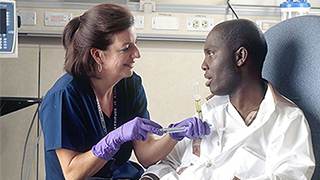Health workers told to discuss faith with dying patients

Healthcare workers should do more to talk to dying patients about faith, experts have said.
The National Institute for Health and Care Excellence (NICE) has advised health workers and care workers to do more to discuss patients’ social, cultural and religious preferences.
It comes as a 2016 report showed that spiritual wishes were only documented for one in seven people dying in English hospitals, who were able to communicate in their final days.
End of life care 'goes far beyond' pain management
NICE said that three-quarters of deaths in England each year are anticipated by medical staff.
The organisation has set out a series of measures designed to help patients in their final days – addressing spiritual concerns as well as physical ones.
Sam Ahmedzai, who is professor of palliative medicine and a specialist member of the NICE quality standard committee said: "Control of pain and other distressing symptoms is very important for dying people, but good end of life care goes far beyond that.
"It includes asking about the dying person’s spiritual, cultural, religious and social preferences. Only by attending to these issues and concerns can we deliver truly individualised care for each person and those important to them.
"Nice wants to put the dying person and those important to them at the heart of decisions. This means asking people what they want and providing what they need, whenever possible."
Importance of discussing spiritual beliefs
Revd Dr Malcolm Brown, who is the director of mission and public affairs in the Church of England, welcomed the new advice.
"We particularly welcome the advice to ask people, as they approach death, about their spiritual and religious concerns," he said.
"People’s views and needs can change radically as the inevitability of death approaches and dying can be eased considerably if careful opportunities to express or discuss these matters are created.
"For people approaching death who would like to discuss questions of religion and spirituality, or who wish for religious rites to be observed, chaplains in the NHS and in hospices are experienced in providing this dimension of care.
"Chaplains, of different religions and beliefs, are also available to support healthcare staff in broaching these questions with dying patients."
Nurse fired for talking about faith
The new advice contrasts sharply with the experience of Sarah Kuteh, a nurse who was fired for talking about faith with patients whilst helping them to prepare for surgery.
Sarah, from Bexley, had 15 years' experience as a nurse. Part of Sarah’s job involved helping patients to fill out pre-op questionnaires, which included questions about the patients’ faith.
But Sarah was investigated and dismissed this August for "gross misconduct".
Supported by the Christian Legal Centre, the mother-of-three is seeking reinstatement and compensation.
Opportunity for salvation
Commenting on the new guidance from NICE, Christian Legal Centre CEO Andrea Williams said:
"It is good that health workers are being encouraged to talk about matters of faith with patients as they live out their final days.
"For some, this is their only opportunity to give their lives to Jesus – to repent of sin and confess Him as Lord and Saviour.
"But despite the acknowledgment that talking about spirituality is important for patients, we have seen Christian health-care workers penalised for doing just that.
"Medical authorities should accommodate discussion around religious beliefs not only in a patients’ final days but in other contexts where such a conversation might be welcomed."
Related Links:
Christian nurse sacked for talking about faith with patients
NHS should 'do God' new guidance suggests, with doctors urged to ask the dying about their religious views (Telegraph)
Interview with Talking About Dying author
